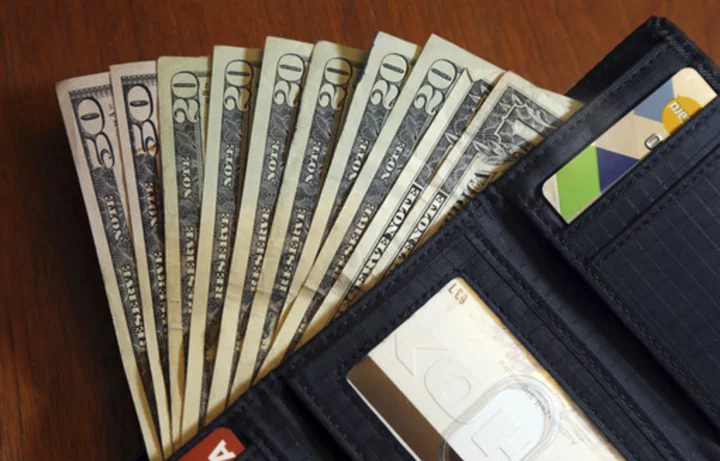Shoppers gearing up for the 2023 holiday season won’t have to look hard for a convenient way to pay for all those presents.
“ Buy now, pay later,” a type of payment plan that divides the total cost of your purchase into smaller installments, is offered at most major retailers, including Walmart, Target and Amazon. It’s expected to fuel $17 billion in online holiday spending this year – up almost 17% from 2022 – according to forecast data from Adobe Analytics, an analytics and measurement tool from software company Adobe.
The short application, immediate approval decision and no hard credit check can make buy now, pay later seem like a no-brainer financing option, but experts say it’s risky. Ask yourself these five questions before opting in.
1. DOES THIS PLAN CHARGE INTEREST?
While most shoppers will encounter zero-interest pay-in-four plans — which divide the cost of your purchase into four equal installments with the first due at checkout, and the remaining three due every two weeks — longer, interest-bearing payment plans are becoming more common.
These plans range from months to years and charge an annual percentage rate of up to 36%, depending on the provider.
You’ll want to avoid interest since it adds to the cost of your holiday purchases. But even if you get a zero-interest offer, make sure you can cover the installments, says Vaishali Shah, a certified financial planner based in Winston-Salem, North Carolina.
“With a 0% interest rate, it seems like no risk,” she says. “But I want consumers to know they’re still obligating themselves to these payments.”
2. WHAT ARE THE FEES?
Though some buy now, pay later providers promise zero fees, many charge late fees, which are typically around $7 or $8 per missed payment.
Providers may also charge installment fees, account reactivation fees, card payment fees, payment rescheduling fees or service fees. These fees range from $1 to $15.
Read the loan terms carefully and keep in mind that there can be fees on the other side of the transaction. If the buy now, pay later provider withdraws a payment that causes an overdraft of your bank account, your bank may charge a fee.
3. DO YOU HAVE A PLAN TO PAY IT OFF?
Overextension — or taking on more debt than you can afford — is one of the biggest risks of using buy now, pay later, partly because of the delayed payment structure.
For example, a $100 purchase becomes $25 at checkout with a no-interest, pay-in-four plan. This can lead shoppers to buy more or make a habit of splitting up purchases.
Todd Christensen, an accredited financial counselor based in Boise, Idaho, says he often sees clients opt in to multiple, small-dollar buy now, pay later loans without realizing how the payments add up.
“It’s the trend of shopping by monthly payment rather than price,” Christensen says. “So we make a little payment here, a little payment there, and then pretty soon every dollar of our income — and then some — is spoken for.”
Take into account your other obligations and know how you’ll cover each installment before signing up for buy now, pay later.
4. WILL YOU NEED TO MAKE A RETURN?
If there’s a chance you’ll need to return a holiday gift, it may be best to avoid buy now, pay later altogether.
Buy now, pay later returns can be tricky because they need to go through two parties: the store you bought the merchandise from and the buy now, pay later provider that financed it.
If there’s a dispute about a return, your refund may be delayed, and some shoppers may have to keep making payments until the dispute is resolved, according to a September 2022 report from the Consumer Financial Protection Bureau.
5. CAN YOU PAY WITH CASH?
Both Shah and Christensen urge consumers to save for holiday shopping, starting now.
Shah has her clients create a “mini-budget” during the holidays. List everyone you need to buy gifts for and the amount you’re comfortable spending. Once you have the total, start socking away the funds, ideally in a high-yield savings account, in the weeks leading up to your shopping.
If you don’t have extra cash to set aside, Christensen advises rethinking your holiday shopping instead of financing it.
“The reality for most people is that if we can’t afford to buy it now, we can’t afford to buy it generally,” he says. “We have to start asking ourselves, ‘Is this really my priority?’ You only have a limited amount of money, and it needs to go to the most important things.”
____________________________
This article was provided to The Associated Press by the personal finance website NerdWallet. Jackie Veling is a writer at NerdWallet. Email: jveling@nerdwallet.com.
RELATED LINKS:
NerdWallet: What is buy now, pay later? https://bit.ly/nerdwallet-buy-now-pay-later

